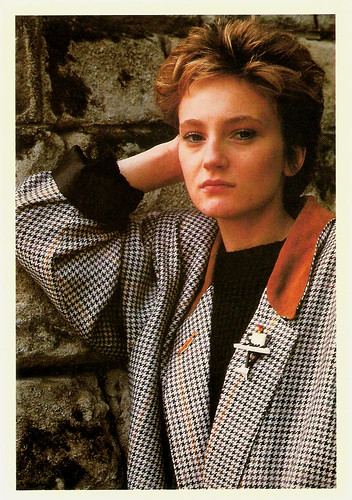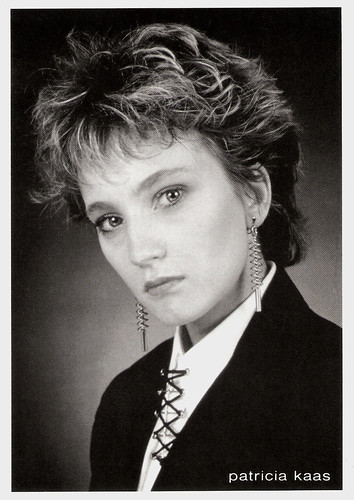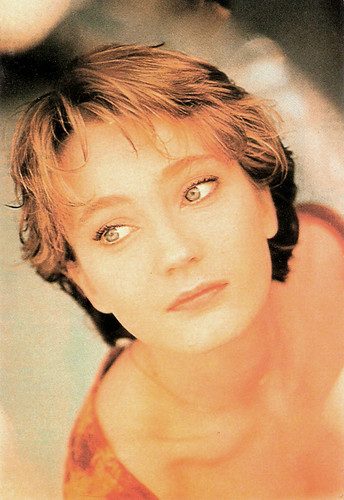
British postcard by New Line, no. 115.
Throaty, smoky voice
Patricia Kaas was born in Forbach, France, in 1966, near the border of Germany. She was the youngest of seven children of miner Joseph Kaas and his wife Irmgard Kaas. Her father was a French Germanophone citizen, and her mother a West German citizen from Saar.
Until the age of six Patricia spoke only Lorraine Franconian. Her mother encouraged Kaas to become a singer at a very young age. At the age of eight Kaas already sang at various small events; among others the marriage of her brother.
Her first great success came when she received first place at a pop song contest. At her first appearances Kaas was already displaying the throaty, smoky voice that would lead to comparisons with Édith Piaf and Marlene Dietrich. Kaas took her first step into the professional music business at the age of 13, when, with the help of her brother Egon, she signed a contract with the Saarbrücken Club Rumpelkammer. Kaas took the name Pady Pax, after the brass band Pax Majorettes, of which she and her sister Carine were members, and for seven years appeared with the band Dob's Lady Killers.
At 16 she took a placement with a model agency in Metz. Kaas' first attempts to break into the music business once and for all initially failed, however; a producer rejected her on the grounds that the world did not need a second Mireille Mathieu. Architect Bernard Schwartz introduced the 19-years-old to the songwriter François Bernheim who worked with her and convinced Gérard Depardieu to produce her music.
In 1985, Depardieu produced Kaas' first single Jalouse (Jealous), written by Bernheim and Depardieu's wife Elisabeth. The single was published by EMI, but was a flop. Nonetheless, her encounter with Depardieu was an important event in the beginning of Kaas' artistic career.
French songwriter Didier Barbelivien became aware of Kaas. His song Mademoiselle chante le blues (Lady sings the blues) was the singer's first big hit. The single was published in 1987 by Polydor, and reached 7th place in the French singles chart.
The next year Kaas' second single D'Allemagne (From Germany) was recorded, written by Barbelivien and Bernheim. Shortly afterwards Kaas' first album Mademoiselle chante... was produced. It reached 2nd place in the French album charts and stayed there for two months, remaining in the Top 10 for 64 weeks and 118 weeks in the top 100. Shortly after its appearance the album went gold in France (over 100,000 sold) and after three months it went platinum (over 350,000 sold). The album also went platinum in Belgium and Switzerland, and gold in Canada.
In the same year Kaas won one of the most important French music awards, the Victoires de la Musique in the category of Discovery of the Year. In 1989, Kaas suffered a traumatic personal experience when her mother fell ill from cancer and died. The teddy bear Kaas sent to support her mother's convalescence today accompanies Kaas everywhere as a mascot.

French postcard, no. 134.
I address thee as you
In 1990, Patricia Kaas began her first world tour which lasted 16 months in total. She sang in front of about 750,000 fans in over 196 concerts in 12 countries. Kaas sang daily for a week at the Olympia in Paris, and gave successful concerts in New York and Washington D.C. At the end of the tour, Mademoiselle chante... had sold 1 million copies in France alone.
In 1990, Kaas moved from her former record company Polydor to CBS/Sony. Cyril Prieur and Richard Walter of the firm Talent Sorcier from Paris replaced Bernard Schwartz to become her managers in 1987. Prieur and Walter contributed significantly to the singer's success, in return for which Kaas referred to them as her ‘family’.
She produced Scène de vie (The Stage of Life) in 1990. It reached the top of the French charts and stayed there for 10 weeks. With the song Kennedy Rose, Kaas again worked with Elisabeth Depardieu and François Bernheim. The song was dedicated to Rose Kennedy, matriarch of the Kennedy clan and mother of former U.S. president John F. Kennedy.
While on the Scène de vie tour, the singer performed 210 concerts before 650,000 spectators in 13 countries, among them Japan, Canada and the USSR, where she sang in Moscow and Leningrad. At the end of 1991 her first live album Carnets de scène (Stage Notebooks) appeared.
Kaas' 1993 album Je te dis vous (I address thee as you, also named Tour de Charme) was her definitive breakthrough in the international music scene, selling 3 million copies in 47 countries. It was produced in Pete Townshend's Eel Pie Studio in London, England by Robin Millar, who had already worked for Sade and the Fine Young Cannibals.
On the album Kaas sang her first song in German: Ganz und gar (Absolutely), by Marius Müller-Westernhagen. The album also featured three tracks in English, including a cover of the James Brown number It's A Man's World. The British rock musician Chris Rea accompanied Kaas on the tracks Out Of The Rain and Ceux qui n'ont rien (Those who have nothing) on guitar.
Je te dis vous was a successful album in the German-speaking world, and with the single Il me dit que je suis belle (He tells me I'm beautiful) by Sam Brewski (aka Jean-Jacques Goldman) Kaas achieved her second top five single in France. The song was used by director Bertrand Tavernier in his film L'appât/The bait (1995). The Je te dis vous world tour covered 19 countries including Vietnam, Cambodia, Japan, Korea and Thailand.
Kaas sang the title song to the film Les Misérables (Claude Lelouch, 1995), based on the novel of the same name by Victor Hugo. In the middle of the 1990s the album Black Coffee was produced, an enigma in Kaas' career. The title track of the album is a cover version of the Billie Holiday song and other cover versions on the album include classics such as Bill Withers' Ain't No Sunshine and If You Leave Me Now by Chicago.
In 1997 Dans ma chair (In my flesh) was made. It was produced in New York by Kaas and Phil Ramone, who had previously worked with Ray Charles, Billy Joel and Paul Simon. The album marked the second time the singer officially worked with the French songwriter Jean-Jacques Goldman. The collaboration with Goldman, which continues to this day, was one of the most important of Kaas' career. Further contributors were Lyle Lovett and James Taylor.
In 1999 Le mot de passe (The password) was produced by Pascal Obispo, on which Kaas was accompanied by an orchestra on several tracks. Jean-Jacques Goldman again contributed songs for the studio album. In 2000, Kaas decided to live in Zürich, Switzerland from then on. This also had consequences for her management, which likewise moved from Paris to Zürich and renamed itself International Talent Consulting. Cyril Prieur and Richard Walter remained by Kaas' side.

French postcard, no. C 139.
Strong gender
In 2001, Patricia Kaas began her acting career with And now... Ladies and Gentlemen (Claude Lelouch, 2001). She played the burned-out jazz singer Jane beside Jeremy Irons. The film was shown at the Cannes Film Festival, but fared poorly at the box office.
Todd Kristel at AllMovie: “there isn't a lot of heat between the two leads, the supporting characters are underdeveloped (and their story lines are distracting), the film's tone fluctuates unevenly from one scene to the next, and there's not much narrative drive to this movie. The end result is an attractive-looking motion picture that isn't fully satisfying emotionally.”
To accompany the film, the concept album Piano Bar By Patricia Kaas was released in 2002. While not a soundtrack to the film, some songs performed from the film were included on the album in slightly different versions. Piano Bar... was Kaas' first album mainly in English, and is a homage to the great French chanson artists, including an English version of Jacques Brel's Ne me quitte pas, If You Go Away. The album in France reached 10th place in the charts, but it was the second most successful of Kaas' albums in Germany.
In 2003, the album Sexe fort (Strong gender), reached the 9th place in France. Again Jean-Jacques Goldman and Pascal Obispo contributed songs. At the end of that year, she received the First Class Order of Merit of the Federal Republic of Germany for her contribution to friendship between France and Germany.
Until the end of 2005 Kaas was on what was now her seventh world tour for which she gave 175 concerts before more than 500,000 spectators. Despite the relative failure of Sexe fort, the tour was a huge success.
After a long break, Kaas released in 2008 the song Ne pozvonish' (You Will Not Call) with the Russian rock group Uma2rman, which was a big hit in Russia. The new double album, Kabaret was released in 2009, and to support the album she went on a lengthy international tour.
In 2009, Kaas represented France in the Eurovision Song Contest 2009 in Moscow, Russia. Her song was Et s'il fallait le faire (And if it had to be done) and she finished in 8th place. In 2011, Kaas’ autobiography L’Ombre de ma Voix (The Shadow of My Voice) was published, and has since then been translated into more than 6 languages.
Her next album Kaas chante Piaf (Kaas Sings Piaf, 2012) with 21 Édith Piaf’ songs, arranged by Abel Korzeniowski, who also composed the music for Madonna’s W.E..
Patricia Kaas played a woman whose daughter is murdered in the TV film Assassinée/Murdered (Thierry Binisti, 2012). The film was highly popular in France when it made its TV debut and Kaas got good reviews for her role. Documentary maker portrayed her for the German TV documentary Patricia Kaas – my life/ma vie.
Since 1988, Kaas has sold over 16 million records worldwide. About her private life, there is no information at the web.
Clip of Patricia Kaas' Il Me Dit Que Je Suis Belle. Source: PKaasOfficiel (YouTube).
Official US trailer And now... Ladies and Gentlemen (Claude Lelouch, 2001). Source: Movieclips (YouTube).
Clip of Paricia Kaas' song Kabaret. Source: PKaasOfficiel (YouTube).
Sources: Johanna Ouwerling (Patricia Kaas Forever), Jason Ankeny (AllMusic), Todd Kristel (AllMovie), Wikipedia and IMDb.
No comments:
Post a Comment